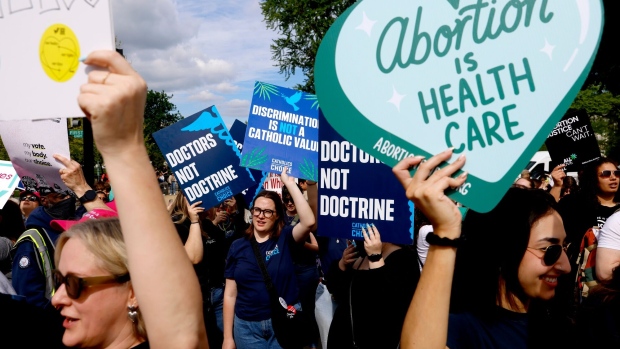Jun 24, 2024
Republican Push to Limit Abortion Access Falters Two Years After Dobbs
, Bloomberg News

(Bloomberg) -- Two years after the Supreme Court delivered the religious right their long-sought goal of repealing nationwide abortion rights, state-level initiatives to curb access are faltering.
Deadlines are rapidly approaching ahead of November’s general election, but in state after state, Republican activists are falling short of the signatures necessary to put anti-abortion initiatives in front of voters.
Their struggle comes even as groups seeking to enshrine abortion rights are easily finding support for their own ballot initiatives - underscoring the political momentum behind restoring abortion rights that has crystallized since the 2022 Dobbs v. Jackson Women’s Health Organization decision. Democrats believe the issue offers their best chance of retaining the White House and winning control of Congress in November.
That’s set off alarm bells among religious and conservative political organizers, who worry that efforts to limit access to the procedure in states could be petering out. Moreover, they say, the struggle could reverberate in an election between two historically unpopular presidential candidates. While Democratic die-hards disillusioned by President Joe Biden might still show up to vote for efforts enshrining abortion rights, Republican base voters skeptical of former President Donald Trump won’t have an anti-abortion initiative to rally behind.
A new KFF poll found 53% of women Democrats in states with potential abortion ballot initiatives are “more motivated” to vote in the presidential election, and are more likely than Democratic women in other states to say they’re voting for Biden. More broadly, 63% of Americans said abortion should be legal in all or most cases, according to a Pew Research Center survey released in May, up 4 percentage points from the year before the Dobbs decision.
“They’re trying to both confuse voters and convince them that their bans on abortion are reasonable, and we know from both public opinion polling and from the results in the last cycle of ballot initiatives that abortion bans are wildly unpopular,” said Olivia Cappello, spokesperson for Planned Parenthood Action Fund.
In Colorado, anti-abortion rights organizers failed to gather enough signatures for an initiative that would have banned the procedure. Instead, a measure that would enshrine abortion protections in the state constitution made it on the November ballot.
It’s a similar story in Arizona, a battleground Biden won in 2020.
A group of reproductive rights groups said they had enough signatures to get a constitutional amendment on the ballot that would ensure access to abortion until fetal viability, or about the 24th week of pregnancy. Arizona Republicans have discussed plans for several initiatives that would limit abortions, according to a presentation obtained by Bloomberg News, but none have been filed ahead of a July 3 deadline.
Without anti-abortion measures on the ballot, pro-abortion rights groups can offer their proposals to voters unchallenged. That strategy proved successful in turning out Democrats in the two years since the Supreme Court overturned Roe v. Wade. That, in turn, could further heighten scrutiny of Trump’s refusal to weigh in on state limits on abortion access.
Conservatives are still working to get measures placed in key states. Having multiple initiatives on the ballot could muddy the waters in a way to help defeat pro-abortion rights pushes, said political strategist Alex Patton, who has consulted for Republican candidates.
“What you are going to see is the opposition trying to kick up as much dust and create as much doubt about the ballot initiative, because that’s how these initiatives get defeated,” he said.
In Nebraska, which has one competitive electoral vote, a coalition of religious conservatives and Republicans are supporting a measure that would write the state’s existing 12-week ban with exceptions into the state constitution. A separate petition is circulating in support of a total abortion ban with no exceptions.
Those are meant to counteract a third measure that would amend the constitution to allow abortions up until the point of viability. None of the organizers have said whether they have collected enough signatures to get any of these measures on the ballot by a July 3 deadline.
“We all know that other states have been challenged with abortion initiatives and the outcome has not been good, so I think the competing is necessary, especially for a state like Nebraska where we are overwhelmingly pro-life,” said Sandy Danek, executive director of Nebraska Right to Life, which is supporting the 12-week ban.
A proposed amendment to New York’s constitution barring discrimination based on gender identity and pregnancy outcomes, which Republican lawmakers sued to strike from the ballot, was restored by an appellate court in a win for Democrats. Republicans have said they plan to appeal to a higher court.
Florida Governor Ron DeSantis has launched a political committee to target a variety of ballot initiatives that are set to be on the November ballot, including one protecting access to abortion.
But DeSantis’ group hasn’t raised any money yet and other anti-abortion rights groups are being significantly outraised by organizations that support abortion access.
The pro-abortion rights group Floridians Protecting Freedom, backed by donors such as the left-leaning Tides Foundation and hedge fund manager Donald Sussman, raised $29.7 million through May. Its anti-abortion rights counterpart, Florida Voters Against Extremism, has raised just $134,296 and received in-kind donations of $135,351.
As polling consistently finds the economy and immigration to be top of mind for voters, GOP strategist Maura Gillespie suggested a different approach for Republicans.
“Focusing more on immigration and border security and the economy,” she said. “That’s a better message to go on.”
--With assistance from Claire Suddath, Bill Allison, Gregory Korte and Josh Wingrove.
©2024 Bloomberg L.P.







